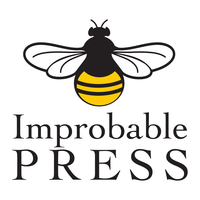By Atlin Merrick
Writers often ask if I want to look at the first draft of the novel they're writing for Improbable Press. It's a sensible question with what may be an unexpected answer for most new writers:
No, please, I do not ever want to see the draft of your novel. Ever.
What is a First Draft?
First draft—what does that even mean?
The answer depends on you, actually.

If you're the kind of person who plots everything—who knows your book is going to be fifteen chapters, in chapter eight the orphan will find his parents, in twelve the soldier with her rare birthmark will appear, and in the final chapter they'll marry the ghost and live in a mansion forever happy—well, the first draft by your estimation may be when you've actually written all those beats down.
For others the first draft may be a core dump of everything they know about the story, characters, setting and so on, exceeding the word count by leaps and bounds but getting the bulk of the book on the page.
I will never be either of you, ever.
I write like someone threw the entire book's words at me and I have to puzzle-piece them together. Ah, these words go in chapter fourteen! Aaaaand, maybe these go in chapter two. Nope, they go in chapter ten and partially in five. For me a first draft is when I actually have the book completely written. Only poorly. With Jamie's name changed to Aine half-way through and then changed back and so now both those names are in there somehow and—
Um, anyway.
Why An Editor Doesn't Want to See Your Novel's First Draft
If you're one of these types of writers or a mix of both or a fourth thing altogether the reason an editor doesn't want to see your novel's first draft is this:
You may change the story
You know what's in your head, you know the nuance of the characters way before you even think you do. If I look at the early work, I may misunderstand and see a half-drawn character as someone you've written poorly and suggest changes, even though that character would have been great if you'd had a chance to finish their development. Same for setting, plot, all of it. I don't know as much as you do about this world, so my opinions on it at this point only muddy the waters.
Your editor isn't writing the book, you are
It is you, only you who is building this brave new world. My job is never to walk you through the thickets of plot development, characterization, or structure. That is your journey alone and so you must do all the hard work of telling your story. This Sisyphusian task is the bane-joy of all writers everywhere, we feel ya, but as editors we can't help just yet.
We need to know you can finish
How much is too much? If early on your editor aids with a plot point here, guides you through some structure here…where does it stop? We want your book to be in your voice, from your head, and for you to make it so good that we want another, but if we're not sure you can finish the first one without help, how will we know you can finish a second? A third? A series?
An editor has one job to do
We're here to help you polish your wonderful prose. We're here to step back from the book and look at it with fresh eyes. When we do that we can see the shiny whole of your story. We can admire where it scintillates and see where it may slow or veer into thickets. We help you buff off rough edges, gild fine points. If you wonder what editing literally entails here's a bit of radical transparency on how we edit your book.
I think it's fair to say most editors are writers, so we kinda know what's happening in your head right now. We know it'd feel great if the commissioning editor looked at your first 10,000 words and gave you some guidance, but this isn't how creativity works. Unless we're collaborating, your brilliant brain is the one that deep down in its depths knows the robot can't shoot straight, the villain is the hero's daughter, and an asteroid is headed for the space station. If the editor muddles in now none of those uniquely-you key points may ever surface.
So sit on down and write all of it. When you're done with that first draft you'll let it sit and come back to go through it again. And maybe again. And definitely do share your drafts with friends, family, betas, anyone you trust. Let them help if it helps. And when you've created the absolute best book you can? That's where your editor comes in to see if they can help you make it even better.
We want your book to be great, we believe you can do it, and we're eager to see it when it's done. Scintillating and shiny and—holy crap she's the robot's daughter?!?

This was helpful and fun.